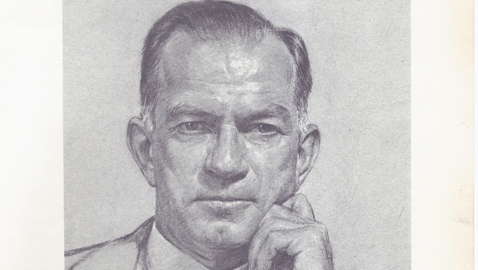By Ray Hill
While growing up, one of the names I heard most frequently on the television news was that of J. William Fulbright, the senator from Arkansas and Chairman of the Senate’s Foreign Relations Committee. Of course that was during a time when there were only three national television networks, a far cry today when there are entire channels reporting news.
James William Fulbright was born April 9, 1905 in Missouri. Fulbright attended the University of Arkansas and seemed to be a well-rounded student, excelling at pretty much everything he chose to do. Fulbright went on to attend Oxford University in England where he was a Rhodes Scholar. The future senator also attended George Washington University School of Law where he earned a law degree. Fulbright immediately found a job in the Justice Department during Franklin D. Roosevelt’s New Deal.
Fulbright did not tarry long in Washington, D. C. and returned home to Arkansas where his mother, Roberta, was highly esteemed, owning and publishing a newspaper. Fulbright accepted a position at the University of Arkansas and remained there for three years before being appointed as President of the university in 1939. Only thirty-five years old at the time, Fulbright was the youngest university president in the country.
Fulbright became embroiled in the oftentimes personal politics of Arkansas and left the university. He sought election to Congress in 1942 and was elected. Fulbright remained in the House of Representatives for a single term, as he was eyeing the seat of Arkansas’s senior United States Senator, Hattie Wyatt Caraway.
Hattie Caraway was the first woman ever to be elected to the United States Senate. Her husband Thaddeus had been first elected in 1920 and had died in office in 1931. Mrs. Caraway had been appointed to succeed her husband and virtually every ambitious politician in the state contemplated making a bid when the seat came open in 1932. Some insist Mrs. Caraway had pledged not to run before being appointed to the Senate, a claim she vehemently denied. Mrs. Caraway held little hope of being elected, but determined to run anyway. Huey Long, the famous “Kingfish” of Louisiana, felt sorry for the widow and waged a whirlwind campaign on her behalf. Long invaded Arkansas armed with a legion of minions, sound trucks, and tons of literature printed on behalf of Senator Caraway.
The “Huey and Hattie” campaign turned Arkansas politics on its head and Senator Caraway easily defeated her opponents. Long was felled by an assassin’s bullet in 1935 and Hattie Caraway ran for a second six-year term in 1938 facing a serious opponent in Congressman John McClellan who campaigned on the slogan Arkansas “Needs A Man in the Senate.” Evidently the voters disagreed, as he narrowly lost to Senator Caraway.
By 1944, Senator Hattie Caraway was vulnerable. Largely silent inside the United States Senate, Mrs. Caraway had done little to promote herself during her second term. In fact, Mrs. Caraway to this day has been referred to as “Silent Hattie” due to her refusal to speak out on issues.
Senator Caraway had remained popular due to support from women, Federal employees, and labor. Mrs. Caraway had not tended to her mail as closely as she had during her first term, nor had she done much to endear herself to her constituency, but she stubbornly insisted upon running again in 1944.
Senator Caraway faced not one, but two serious opponents in the 1944 Democratic primary: Governor Homer Adkins and Congressman J. William Fulbright. It soon became clear the contest was between Governor Adkins and Congressman Fulbright. Mrs. Caraway was eliminated in the first primary where she ran a very poor fourth.
Governor Adkins was a tough opponent and had built a formidable machine, yet he lost the run-off election to Congressman Fulbright, who despite having served only one term in the House of Representatives, enjoyed much favorable national publicity.
J. William “Bill” Fulbright was to remain in the United States Senate for thirty years.
Fulbright had managed to pass the program named for him within his first two years inside the Senate. That same year, depressed by the success of Republicans in capturing both houses of Congress, Senator Fulbright made the suggestion that President Harry Truman should appoint GOP Senator Arthur Vandenberg of Michigan Secretary of State and resign, giving Republicans the responsibility of running the country. The peppery Missourian in typical fashion snapped that Fulbright was “Halfbright”.
J. William Fulbright was the only member of the United States Senate to vote against funding the permanent investigating committee chaired by Wisconsin demagogue Joseph McCarthy. While Fulbright remained something of a media darling throughout his long political career, he was hampered by the views of his constituency. Fulbright signed the infamous Southern Manifesto supporting white supremacy, a concession to his home state of Arkansas. Fulbright’s support for segregation was especially necessary for him to survive politically at home where Arkansas Governor Orval Faubus was a periodic threat to Fulbright’s continued tenure in the United States Senate. There was considerable speculation amongst many of his constituents that Fulbright’s support for segregation was half-hearted at best.
Still, Fulbright was easily reelected in 1950 and 1956. His seniority in the Senate finally brought him the chairmanship of the Senate’s Foreign Relations Committee, a prize that Fulbright cherished. The incumbent Chairman of the Foreign Relations Committee was Theodore Francis Green of Rhode Island, then eighty-nine years old and increasingly deaf. Senate leaders, including powerful Majority Leader Lyndon B. Johnson of Texas, recognized the failing Green was becoming something of an embarrassment and Johnson led an effort to nudge Green out of the chairmanship to make way for the much younger and more vigorous Fulbright. In an event that was carefully choreographed, Johnson and others got Green to agree to resign the chairmanship of the Foreign Relations Committee and accept the purely honorific title of Chairman Emeritus. Johnson in his typical flowery language praised the Rhode Island senator so fulsomely the elderly Green made the comment that since his colleagues held his service in such high esteem, perhaps he should reconsider resigning. Green’s comment naturally horrified Johnson and his allies and it became necessary to suspend the proceedings so that Senator Green could be taken to a back room and persuaded to issue a statement firmly resigning his committee chairmanship.
Theodore Francis Green finally emerged from the meeting intent upon resigning, thereby allowing J. William Fulbright to become Chairman of the Senate’s Foreign Relations Committee. Fulbright would go on to serve as Chairman of that prestigious committee longer than any other senator.
The Foreign Relations Committee had long been one of the Senate’s most prized committee assignments for many senators. Membership on the Foreign Relations Committee brought attention from the national media and in the whirl of Washington’s social set, it was an especially important assignment. Yet, the chairmanship of the committee was a gift that could cause political problems back home as constituents felt their senator was more interested in countries they had never heard of, while ignoring more parochial problems in the senator’s native state. By the conclusion of his career, J. William Fulbright would carry that burden in his last campaign.
Fulbright vainly held some hope that he would be named Secretary of State by newly elected President John F. Kennedy in 1961, but the Arkansas senator’s support for segregation made him an impossible choice. Fulbright expressed strong objections to President Kennedy’s Bay of Pigs invasion and proved to be a constant thorn in the side of his successor, Lyndon Johnson.
Fulbright was disillusioned with the Vietnam War quickly, when most senators still supported both President Johnson and the war. Fulbright’s constant hearings on Vietnam vexed President Johnson and the Arkansas senator published a book, aptly entitled Arrogance of Power detailing Fulbright’s objections to the war.
Senator Fulbright was reelected in 1968, but there were signs his political strength in Arkansas was eroding. Arkansas was unusual among states as both its senators, John McClellan and J. William Fulbright, had served thirty years and both encountered stiff opposition in their last campaigns by much younger politicians.
In 1974, Senator Fulbright announced he would run for a sixth term. He faced popular Governor Dale Bumpers in the Democratic primary. Fulbright had become a target of those who disliked his opposition to the Vietnam War and many Arkansans felt Fulbright was far more interested in other countries than he was in Arkansas. Despite waging a hard campaign, Fulbright lost badly to Governor Bumpers. It was a humiliating repudiation by Fulbright’s home state voters.
Senator Fulbright retired from the Senate in 1975 and joined one of the most prestigious law firms in Washington, D. C., Hogan and Hartson, where he specialized in international law. Fulbright lived long enough to become a revered figure amongst some circles, as well as watching a protégé, William Jefferson Clinton, rise to become President of the United States of America.
President Clinton awarded the former senator the Presidential Medal of Freedom in 1993. Two years later, Fulbright, aged eighty-nine, died of a stroke. Regardless of whether one liked or disliked his politics, Bill Fulbright’s passing truly was the end of an era.







